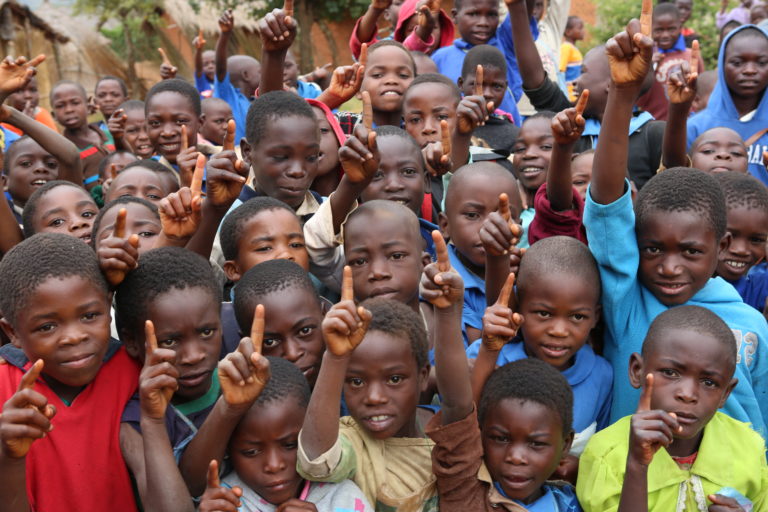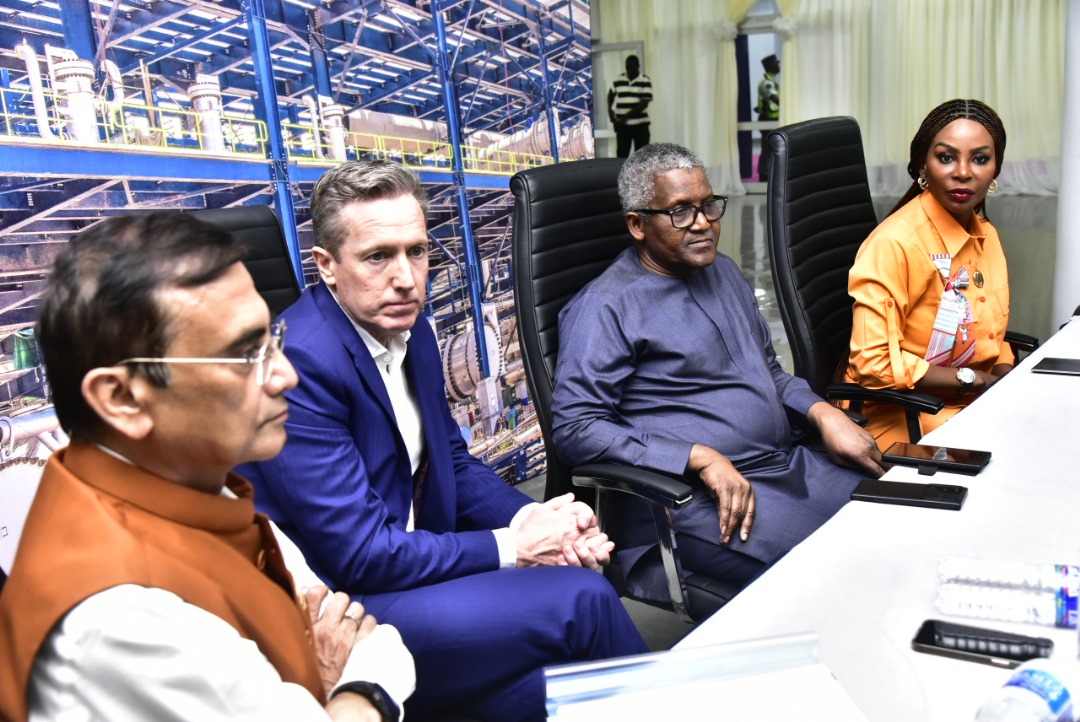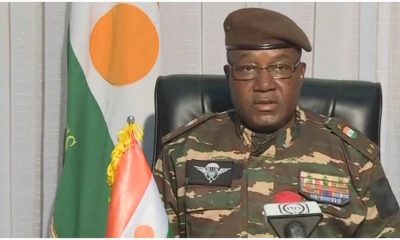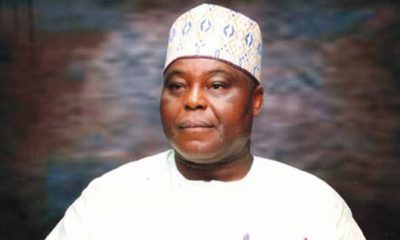News
African Child: UNICEF wants Nigerian govt, stakeholders to explore digitalisation for children development

The United Nations Children Education Fund (UNICEF) has called on government at all levels as well as other stakeholders, to explore opportunities available in the digital space to enhance education, empowerment and overall wellbeing of Nigerian children.
UNICEF stated this in a statement Friday, in solidarity with Nigerian children as the world marks this year’s “Day of the African Child,” with the theme “The rights of the child in the digital environment.
The statement which was signed by Anike Alli Hakeem of the Communications, Advocacy and Partnerships Department, UNICEF Nigeria, stated that- “In realizing this right, we are equally offered the opportunity of exploiting the digital space for learning and development.
“The education sector in Nigeria faces many challenges. One of these challenges is access to quality learning which is inhibited by low domestic spending on education resulting in limited school infrastructure and qualified teachers, high levels of poverty and social norms not supportive of education especially for girls.
“These challenges are exacerbated by attacks on schools and abduction of learners. Both have made parents fearful of sending their children to school.
“The disruption to education by school attacks has meant millions of children have significantly missed out on learning they would have acquired if they had been in the classroom. More than 10 million children are not in school at the primary level. For those in school, the quality of learning is poor; 75 per cent of primary school age pupils are unable to read with understanding or solve a simple math problem.
“To bridge the access to quality learning opportunities, UNICEF and the Federal Ministry of Education launched the Nigeria Learning Passport (NLP) last year, an online, mobile, and offline digital learning platform powered by Microsoft that enables continuous access to 15,000 curriculum aligned learning and training materials in local languages for learners, teachers, and parents.
“It is highly flexible and adaptable, allowing states, schools, teachers, parents, and other users to adapt it easily and quickly as their learning management system in school, for homework support and to ensure continuity of learning when schools are closed in emergency contexts
“The NLP is inclusive enough to bridge the digital divide because of the availability of an offline module that allows for deployment in rural and hard-to-reach environments where there is no access to the internet. To this end, UNICEF has provided 780 schools in hard-to-areas and rural schools with 13,500 tablets, 1,000 smart rechargeable projectors and 780 Airtel internet routers. Connectivity has been enabled for 186 schools through a partnership with IHS towers and data costs removed through the whitelisting of the NLP on an Airtel SIM card.
“So far, since its inception, the Nigeria Learning Passport has provided access to quality teaching and learning resources to 280,000 learners, teachers, parents and young people.
“Result of a user satisfaction survey that was conducted involving 5,002 respondents, 92% of them mentioned that they are using the platform more than once, 51% mentioned that they used it daily and 63% mentioned that they access the platform from home. Additionally, 95% of these respondents mentioned that the content meets their needs, 76% said that they learnt new things and 91% (9 in 10 persons) said that the NLP supported their education,” UNICEF said.
Business
Dangote Refinery to supply 1.5bn litres of petrol monthly

….Writes NMDPRA, Engages Marketers to Stabilise Fuel Market
Photo caption: L R: Chief Executive Officer, Dangote Fertiliser Limited, Vishwajit Sinha; Chief Executive Officer and Managing Director, Dangote Petroleum Refinery, David Bird; President and Chief Executive, Dangote Industries Ltd, Aliko Dangote; Managing Director and Chief Executive Officer, South South Development Commission, Usoro Akpabio, during the visit of SSDC members to the Dangote Petroleum Refinery and Fertiliser Plant in Lagos on Sunday, November 30, 2025.
Dangote Petroleum Refinery has announced plans to supply one billion five hundred million litres of Premium Motor Spirit (PMS) monthly to the Nigerian market in December 2025 and January 2026, a move aimed at ensuring uninterrupted nationwide fuel availability through the festive season and into the New Year.
President and Chief Executive of Dangote Industries Limited, Aliko Dangote, disclosed the plans at the weekend, noting that the refinery will make available 50 million litres of PMS daily beginning December 1.
“In line with our commitment to national wellbeing, and consistent with our track record of ensuring a holiday season free of fuel scarcity, the Dangote Petroleum Refinery will supply 1.5 billion litres of PMS to the Nigerian market this month. This represents 50 million litres per day. We are formally notifying the Nigerian Midstream and Downstream Petroleum Regulatory Authority (NMDPRA) of this commitment. We will supply another 1.5 billion litres in January and increase to 1.7 billion litres in February, which translates to about 60 million litres per day,” Dangote said.
Photo caption: L R: President and Chief Executive, Dangote Industries Ltd, Aliko Dangote; Managing Director and Chief Executive Officer, South South Development Commission, Usoro Akpabio, during the visit of SSDC members to the Dangote Petroleum Refinery and Fertiliser Plant in Lagos on Sunday, November 30, 2025.
Speaking during a visit by the South-South Development Commission (SSDC) to the refinery and the Dangote Fertiliser complex, he stated that the facility currently has adequate stock and is producing between 40 and 45 million litres of PMS daily. He added that the daily supply of 50 million litres should dispel long-standing claims that domestic refineries lack the capacity to meet national demand.
Dangote also revealed ongoing engagement with petroleum marketers to strengthen distribution systems, including expanding the use of CNG-powered haulage.
“Our priority is to ensure Nigeria receives the products it needs. This is not driven by profit motives; it is about guaranteeing the availability of essential energy products. It is similar to the transformation we delivered in the cement sector,” he added.
He further noted that the refinery is progressing with its expansion plan to reach a capacity of 1.4 million barrels per day. More than 100,000 workers are expected to be involved in the expansion of both the refinery and the fertiliser complex. Dangote emphasised that the Group remains committed to its vision, driven by the strong public support for the company’s role in shaping Nigeria’s economic development.
During the visit, the Managing Director of SSDC, Usoro Offiong Akpabio, commended Dangote’s leadership and his continued contribution to strengthening Nigeria’s industrial capability, national energy security and long-term economic competitiveness.
She described the South-South region as Nigeria’s natural energy corridor, with vast crude oil reserves, gas infrastructure, maritime assets, agro-industrial activity and emerging industrial clusters. She noted that deeper collaboration between the region and the Dangote Group could unlock opportunities in product distribution, CNG infrastructure, petrochemicals, agriculture, and employment creation.
Akpabio added that such partnerships would advance the Federal Government’s energy stability agenda and position the South-South as a strategic growth hub for the Dangote Group.
“As the statutory development body for the South-South, SSDC is mandated to drive regional economic development, infrastructure integration, human capital advancement, and private-sector–led growth. In this regard, we stand prepared to support State-level policy and regulatory support for Ease-of-doing-business across our six states. Enabling environments for Dangote Group’s expansion into strategic sectors such as gas processing, agro-industrial value chains, renewable energy, logistics, and export-oriented manufacturing,” she said.
In a letter from the refinery’s Managing Director, David Bird, to the Authority Chief Executive of the NMDPRA, the company reaffirmed its readiness to host NMDPRA officials onsite at the refinery from December 1st to verify and publish its daily supply volumes. The refinery also sought the Authority’s support to ensure unhindered importation of crude, feedstocks and blending components, as well as smooth vessel loading for product evacuation.
“In the spirit of full transparency to the public we are willing to publish our daily production and stock volumes (online and print media),” Bird stated. “We seek the full support of NMDPRA to allow Dangote refinery to import our crude, feedstocks and blending components unhindered as well as support the lifting of our products by vessel. We continue to experience delays in vessel clearance which impacts not only the refinery operations but also our customers, adding unnecessary costs and inefficiencies”.

By Bonaventure Phillips Melah
Photo caption: L R: Chief Executive Officer, Dangote Fertiliser Limited, Vishwajit Sinha; Chief Executive Officer and Managing Director, Dangote Petroleum Refinery, David Bird; President and Chief Executive, Dangote Industries Ltd, Aliko Dangote; Managing Director and Chief Executive Officer, South South Development Commission, Usoro Akpabio, during the visit of SSDC members to the Dangote Petroleum Refinery and Fertiliser Plant in Lagos on Sunday, November 30, 2025.
Dangote Petroleum Refinery has announced plans to supply one billion five hundred million litres of Premium Motor Spirit (PMS) monthly to the Nigerian market in December 2025 and January 2026, a move aimed at ensuring uninterrupted nationwide fuel availability through the festive season and into the New Year.
President and Chief Executive of Dangote Industries Limited, Aliko Dangote, disclosed the plans at the weekend, noting that the refinery will make available 50 million litres of PMS daily beginning December 1.
“In line with our commitment to national wellbeing, and consistent with our track record of ensuring a holiday season free of fuel scarcity, the Dangote Petroleum Refinery will supply 1.5 billion litres of PMS to the Nigerian market this month. This represents 50 million litres per day. We are formally notifying the Nigerian Midstream and Downstream Petroleum Regulatory Authority (NMDPRA) of this commitment. We will supply another 1.5 billion litres in January and increase to 1.7 billion litres in February, which translates to about 60 million litres per day,” Dangote said.

Photo caption: LR: President and Chief Executive, Dangote Industries Ltd, Aliko Dangote; Managing Director and Chief Executive Officer, South South Development Commission, Usoro Akpabio, during the visit of SSDC members to the Dangote Petroleum Refinery and Fertiliser Plant in Lagos on Sunday, November 30, 2025.
Speaking during a visit by the South-South Development Commission (SSDC) to the refinery and the Dangote Fertiliser complex, he stated that the facility currently has adequate stock and is producing between 40 and 45 million litres of PMS daily. He added that the daily supply of 50 million litres should dispel long-standing claims that domestic refineries lack the capacity to meet national demand.
Dangote also revealed ongoing engagement with petroleum marketers to strengthen distribution systems, including expanding the use of CNG-powered haulage.
“Our priority is to ensure Nigeria receives the products it needs. This is not driven by profit motives; it is about guaranteeing the availability of essential energy products. It is similar to the transformation we delivered in the cement sector,” he added.
He further noted that the refinery is progressing with its expansion plan to reach a capacity of 1.4 million barrels per day. More than 100,000 workers are expected to be involved in the expansion of both the refinery and the fertiliser complex. Dangote emphasised that the Group remains committed to its vision, driven by the strong public support for the company’s role in shaping Nigeria’s economic development.
During the visit, the Managing Director of SSDC, Usoro Offiong Akpabio, commended Dangote’s leadership and his continued contribution to strengthening Nigeria’s industrial capability, national energy security and long-term economic competitiveness.
She described the South-South region as Nigeria’s natural energy corridor, with vast crude oil reserves, gas infrastructure, maritime assets, agro-industrial activity and emerging industrial clusters. She noted that deeper collaboration between the region and the Dangote Group could unlock opportunities in product distribution, CNG infrastructure, petrochemicals, agriculture, and employment creation.
Akpabio added that such partnerships would advance the Federal Government’s energy stability agenda and position the South-South as a strategic growth hub for the Dangote Group.
“As the statutory development body for the South-South, SSDC is mandated to drive regional economic development, infrastructure integration, human capital advancement, and private-sector–led growth. In this regard, we stand prepared to support State-level policy and regulatory support for Ease-of-doing-business across our six states. Enabling environments for Dangote Group’s expansion into strategic sectors such as gas processing, agro-industrial value chains, renewable energy, logistics, and export-oriented manufacturing,” she said.
In a letter from the refinery’s Managing Director, David Bird, to the Authority Chief Executive of the NMDPRA, the company reaffirmed its readiness to host NMDPRA officials onsite at the refinery from December 1st to verify and publish its daily supply volumes. The refinery also sought the Authority’s support to ensure unhindered importation of crude, feedstocks and blending components, as well as smooth vessel loading for product evacuation.
“In the spirit of full transparency to the public we are willing to publish our daily production and stock volumes (online and print media),” Bird stated. “We seek the full support of NMDPRA to allow Dangote refinery to import our crude, feedstocks and blending components unhindered as well as support the lifting of our products by vessel. We continue to experience delays in vessel clearance which impacts not only the refinery operations but also our customers, adding unnecessary costs and inefficiencies”.
News
Gunmen abduct five in Enugu community

Some women in Ezimo community, Udenu Local Government Area of Enugu State, on Saturday, staged a protest over the alleged kidnap of five residents and the shooting of another during an attack on the community.
The protesters, who marched through major parts of the community, said the incident had heightened fear and insecurity in the area.
One victim of the attack is currently receiving treatment in the hospital.
A social media influencer, ‘Sen.’ Chijinkem Ugwuanyi, made this known via Facebook on Saturday.
Ugwuanyi revealed that resident who confirmed the incident said recent cases of abductions and shootings had left the community unsafe, prompting the women to demand urgent government intervention.
In a video shared on Ugwuanyi’s Facebook page, the protesters called on the Enugu State Government and security agencies to step in and restore peace, warning that residents could no longer live under constant fear of attacks.
-

 News2 years ago
News2 years agoBreaking: Tinubu’s authentic ministerial nominees
-

 News9 months ago
News9 months agoSenate to speed up conclusion of Nigeria Forest Security Service Bill
-

 News2 years ago
News2 years ago“Anytime we want to kill terrorists, President would ask us to take permission from France but they were killing our soldiers-” Niger Republic coup leader
-

 News2 years ago
News2 years ago“I’m leaving the Catholic church because Bishop Onah is oppressing me,” says Okunerere
-

 News2 years ago
News2 years agoRadio Nigeria’s veteran broadcaster Kelvin Ugwu dies three months after retirement from service
-

 News2 years ago
News2 years agoDokpesi and the Gazebo Mystique
-

 News2 years ago
News2 years agoTsunami: Tinubu orders dissolution of managements, boards of MDAs, to sack all Buhari’s political appointees
-

 News2 years ago
News2 years agoPersons against Allagoa’s reforms behind protests at NSITF
